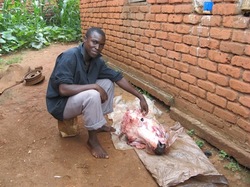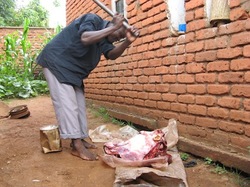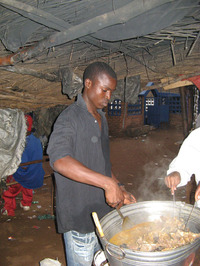I spent nine days in Malawi trying to turn deformed maize, witchcraft, and HIV into catalysts of change. Join me and my Face-to-Face AIDS Project and see how our ideas of charity evolve with on-the-ground experiences.
DAY 7: A DAY IN THE LIFE OF AUBREY
At the end of Form 4, which is the equivalent of 12th grade, students here take the Malawi School Certificate of Education (MSCE) exam. This exam certifies that they've completed their secondary education and positions them for entrance into university. The MSCE exam is similar to the SATs.
Aubrey Namakhwa is with Mike, Christine, and me -- three months after Aubrey took the MSCE exam, the results are finally being announced. I'm online visiting the site where the scores have supposedly been posted. There are 25 pages of school listings. While Aubrey waits silently in the front seat, Christine helps me scan the pages because the listings aren't in alphabetical or geographical order. We get to the last page and still haven't found 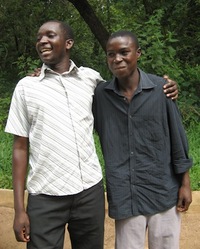
School officials tell us that Aubrey received a score of 16, which is a "pass with distinction." Christine screams with delight. Mike hugs Aubrey. And Aubrey remains silent, but just smiles and smiles and smiles.
Mike then discloses that he was pretty sure that Aubrey passed because Mike's sister had been listening to the radio and thought she heard them announce Aubrey's name. They rattle off about 50,000 names, which takes two or three days of fast reading, and somehow Mike's sister was listening at just the right time. But Mike didn't tell Aubrey, in case she had misheard.
A Dying Mother's Last Wish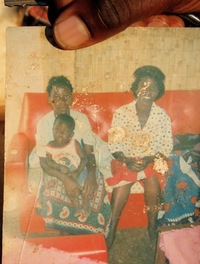
"My son is a good child, and he will study hard," she pleaded. "Please take him. This is my last and only wish, for I am dying of AIDS."
That night, Laws was called to the woman's house, and there he found her shaking violently in bed. She was incoherent, sweating profusely, and in agony. Then she died. The next day, Laws persuaded a local coffin maker to donate a straw mat to wrap the body. Aubrey came back to Law's house where Laws started making arrangements for his schooling.
From Day School to Boarding School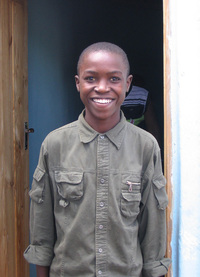
After a year of attending public day school, Laws asked if he could place Aubrey in a boarding school. Aubrey lived with his two older brothers who stayed up late, drank beer, did drugs, and committed petty crimes. They also made Aubrey do all the chores, leaving him too tired to do homework or concentrate at school. Laws and Mike arranged for Aubrey to attend a boarding school and Mike made a special effort to mentor Aubrey so that he wouldn't fall into bad habits or bad company at home or at school.
For the most part, Aubrey excelled in boarding school. Occasionally, Mike made an effort to talk with Aubrey when he was associating with a group of boys who dabbled in drugs, and when he began showing disrespect to his teachers and fellow students. Mike knew that Aubrey held deep-rooted feelings that would sometimes surface; indeed, once Aubrey was so stricken with malaria that he hit and bit a nurse. When he regained consciousness, Aubrey was horrified at what he had done.
As it turned out, Aubrey's oldest brother was found this past October dead in a ditch, apparently beaten by his own comrades after a botched robbery in a furniture store. Aubrey's other brother is fleeing from the law and left his wife's three young children in Lilongwe. So, when Aubrey finished taking his MCSE exams, he returned to Lilongwe to shelter and care for himself and his sister-in-law's children.
Making Cow's Head Stew, Starting with the Cow
When Aubrey came back to Lilongwe, his Face-to-Face scholarship had ended. In order to keep his brother's house, and to provide for his brother's wife's three children, Aubrey started selling cow's head stew at the night market. Here's what Aubrey does to carry out his business.
6:00 a.m.: Go to the animal market, 10 kilometers away.
6:30 a.m.: Pick live cow with biggest head. Pay about $8. First come, first served.
7:00 a.m. to 12:00 p.m.: Wait until all the cow is sold -- legs, tail, quarters, innards, tongue (sold separately from head). Once all the cow is sold and bullet put through its head, cow is butchered and inspected by an official. If the official says the cow is diseased, everyone gets their money back, but must go home empty-handed, because there are no more cows left.
1:00 p.m.: Aubrey arrives home with head in a bag. Singes fur and pulls off hide in one piece. Cuts and places in big pot.
2:00 p.m.: With hatchet and knife, scrapes, chips, and cuts off all edible parts of head, places in pot with water and salt.
4:30 p.m.: Carries pot on head to night market one kilometer away. Prefer to go in daylight so can see footpath.
5:00 p.m. - 10:00 p.m.: At night market, sells stew to women on their way home and then to men drinking beer. Must be careful not to anger drunk, and often belligerent, customers.
10:30 p.m.: Comes home, with profit as much as $5 on a great night, or loss of $3 on a bad night.
Aubrey Follows in Mike's Path
As Mike tried to shield me from flying bone bits (and other things) as I filmed Aubrey hacking his cow head, I kept reminding myself that if Aubrey has been able to come this far as a young adult, I can at least keep holding the camera steady. We're so proud of Aubrey's achievements in school, and of the fact that he isn't wasting any of his free time. He's excited about his future, and we're excited for him.
Aubrey is waiting to take the university exams for Chancellor College, which is Malawi's best school. If he doesn't pass the Chancellor College entrance exam, we tell him that there's no problem in waiting another year to retake the exams. In fact it may be good to wait a year, for in the meantime, he can volunteer and gain experience with some of our projects, especially an innovative youth, HIV, and leadership project we're starting in a rural village.
Still, Mike and I sense that Aubrey envisions himself at Chancellor. As we're heading to visit an orphan center, Aubrey suddenly asks me, 'Do you think I should study to be a doctor or pursue a career in social sciences?'
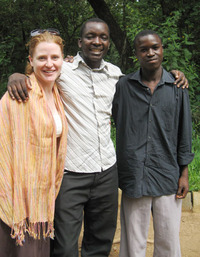
I'm also thinking that it costs a whole lot less to put a student through a three or four-year social science program than eight years of medical school. One other thing -- there's the issue of the quality of education at a local medical school, and whether or not a local medical education is fraught with inefficiencies and corruption.
Mike agrees, adding that Aubrey can be happy with a degree in social sciences.
"Look how happy I am," Mike says, laughing. "You can be happy and poor just like me!"
Reflecting back on the time when Mike himself was shy and quiet, Mike does indeed seem much happier doing the good work he does. I bet Aubrey will begin laughing out loud more, just like Mike does now.
****************
Photo: Christine Shimp, volunteer, Mike Chikakuda, Aubrey Namakhwa
Ken Wong is the director of the Face-to-Face AIDS Project, a documentary and charity-focused 501(c)3 nonprofit based in Brooklyn, New York. Please consider supporting orphans and vulnerable children like Aubrey go to school. Your donation of $30 a month will enable an child go to public day school; your donation of $100 a month help us send Aubrey to university. To donate to our orphan scholarship fund, visit the Contact & Donate page at www.facetofaceaids.org, and include a message indicating that you want your donation to go for orphan scholarships.
